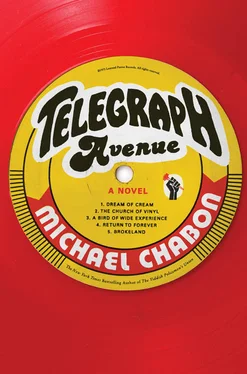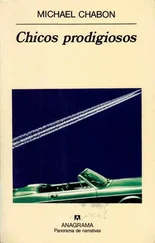“Archy, it’s your dad,” she said, tendering that unpayable IOU, “it’s Luther.”
She raised the sunglasses at him and hit him straight on with twin blasts of yellow-brown fire, with the shock of the bitter work of time and corruption. Cakes of mascara cobwebbed her lashes.
“Yeah?”
Valletta checked out the shadows and rustlings up and down both ends of the street one more time, ran the broom of her paranoia up the quiet little pond of a street built around a pocket playground that some unknown amateur of children had tucked, like an Easter egg, onto an island of grass in the midst of Sixty-first Street. Archy wondered if Valletta might not be high, cashed out on something that was making her go all Pynchonesque. The last time he found himself unable to prevent hearing news of Luther, it was a tale, grand and heartwarming, of cleanness, sobriety, redemption. Luther had drawn a judge down south who remembered Strutter and, never having been the man’s son, was willing to take a chance on Luther Stallings, divert him to a drug court. Luther went around after that, supposedly, making amends to 17,512 people on two continents. That was at least a year ago, and the amends that Archy consented to allow his father to make to him at the time had consisted, in full, of a sober, clean telephone promise to leave Archy the fuck alone from now until the end of time.
“Can we go in?” she wanted to know, sighing, impatient, maybe, he thought desperately, only needing to pee. “Inside your house?”
“Huh-uh,” Archy said, not trying to charm or work her anymore, the deep 1978 El Cerrito–apartment sullenness starting to seep out of him as he remembered how Luther and Valletta used to leave him there all night by himself, nothing on the television but Wolfman Jack and some movie where a shark-toothed devil doll was biting Karen Black on the ankles. Only thing he wanted to know now: what kind of bullshit trouble Luther Stallings was trying to get Archy into this go-round and how much it was going to cost in blood and treasure. “Just say what you came to say. No joke, Valletta, I really do have to go.”
“Mm-hmm, yeah, you ain’t changed,” she said, lighting up icy diodes at the heart of those eyes that, in the summer of 1977, had stared not only into Archy’s soul but into the soul of young black America from the covers of Jet and Sepia and from the feathers-fur-and-leather kung fu splendors of her role as Candygirl Clark in one of the last blaxploitation films of that era, Strutter at Large , in which she costarred with a lean, wiry, and beautiful Luther Stallings in his most famous part. “Still walking around all pinch-up and pouty-face, giving everybody a fish-eye, most of all your father or his friend.”
“Y’all are still friends, then.”
“We took up with each other again. Third time, you know what they say.”
Archy had contrived to miss the second near-fatal intersection of Luther and Valletta by cleverly timing his service in the United States Army to coincide with the geopolitical hard-on of Saddam Hussein.
“He back in town, then?”
She stared him down, challenging him, not wanting to give up anything if he was going to make her stand out on the damn sidewalk to say it.
“And now you come around here. Saying Luther sent you, is that right? Come around here hoping to find out what, exactly?”
“Luther don’t know nothing about it. Man knew I was here…” She chewed on the earpiece of her sunglasses, seeming to rehearse Luther’s anger in her mind. “He knows how you feel, he wants to respect that.”
“So you don’t want money.”
“Truly,” she said, “I do. I’ll take whatever you can spare me. We need to get far away from here and stay there.”
It did not take a lot of effort for Archy to harden his heart against his father; that clay was well fired, long and slow. Anger, resentment, scorn, disgust, Luther’s son kept these handy in the pocket of his soul as surely as the copy of Meditations at his hip. So it must testify to something, some abiding foolishness peculiar to the sons of broken fathers, that it took any effort at all. Thirty-six years of this shit, and Archy was still willing to let the man disappoint him.
“I’m not going to ask why,” Archy said. “Because if you don’t tell me, then I won’t know.”
“Archy, I can’t get into it out here.”
“I am so fine with that, Valletta.”
“Your daddy… Luther…” She tried for a couple of seconds, pursing her lips, tapping them pensively with her right fist, to put it into words. Then she gave up. “He been clean and sober thirteen months now.”
“Uh-huh. Good for him.”
“And, like, now he got some irons in the fire.”
“I bet he does,” Archy said, thinking that was the perfect expression to describe the future as it stood in permanent relation to Luther Stallings: a big pile of irons glowing red-hot, to be snatched from the fire only at the cost of singed flesh. “Investment opportunities, that right?”
She fell back once more on her optic beams, but either this time Archy was ready or the effect had begun to dull. She lowered the sunglasses again.
“Let me guess,” Archy said. “Because I am experiencing premonitions.”
Chan and Luther unhooked a heavy chain between two pillars, left the Toronado tucked into a fold of midnight at the back of a gravel parking lot. Crunched up a hillside through fumes of eucalyptus, Chan carrying the shotgun, to a lookout they at one time favored for planning their conquests of the world. At their spot Chan turned and swung the gun, let it fly. It helicoptered out into the night and came whipping down with a clang of pipe somewhere in the woods behind them. Then they sat on their bench, perched side by side on the high shoulder of Oakland. Looked out at streets and bridges and highways embroidered, stitched out, in lights onto dark panels of water and sky.
In the interest of furthering his stone-cold pistolero legend, of which purity was to form a key component, the Undertaker never drank and rarely smoked. Luther passed him a package of Kools, and the Undertaker took one and lit it. Luther fished a fifth of Rumple Minze from his jacket pocket. The Undertaker surrendered the last fragment of his stillborn legend to the possibility of solace offered by the bottle of schnapps.
“He grabbed hold of his wrist, sat there looking at it,” Chan said, wiping his lips. “Meat and blood. A stump. All calm and collected, cuff of his jacket shot up to threads. Just a rag where his hand used to be, looking at it.”
“Popcorn Hughes,” Luther said admiringly.
“I need to hide myself, Luther.”
“Where at?” Dread inflated a taut balloon in Luther’s rib cage. He could barely muster breath to get out the next syllables: “L.A.?”
For that was the obvious solution: Swing by Luther’s mother’s house and pick up the canvas suitcase and the three Berkeley Farms crates, packed and ready to go. Hit L.A. by morning, Chan could buy what he needed when they got there. Track down some shitbox safe house where Chan could hole up. Wave goodbye then. Engage in the theater of turning their separate ways, meeting their respective fates, until the next of his friend’s schemes went wrong, the next time Chan found himself confronting the truth that his faith in himself was misplaced, his intelligence fated to go unrewarded because it was no substitute for luck, no proof against the world’s massive, even hostile, indifference to the productions of a black man’s intellect. Like the Party he had joined too late, too young, Chan was a lost claim check, a series of time-lapse photos of a promise as it broke. He was a king of finite space, bound in a nutshell. And Luther was sick of it. He rued all the time he had wasted since the call came from his agent, feeling guilty, feeling sorry for Chan.
Читать дальше
Конец ознакомительного отрывка
Купить книгу












